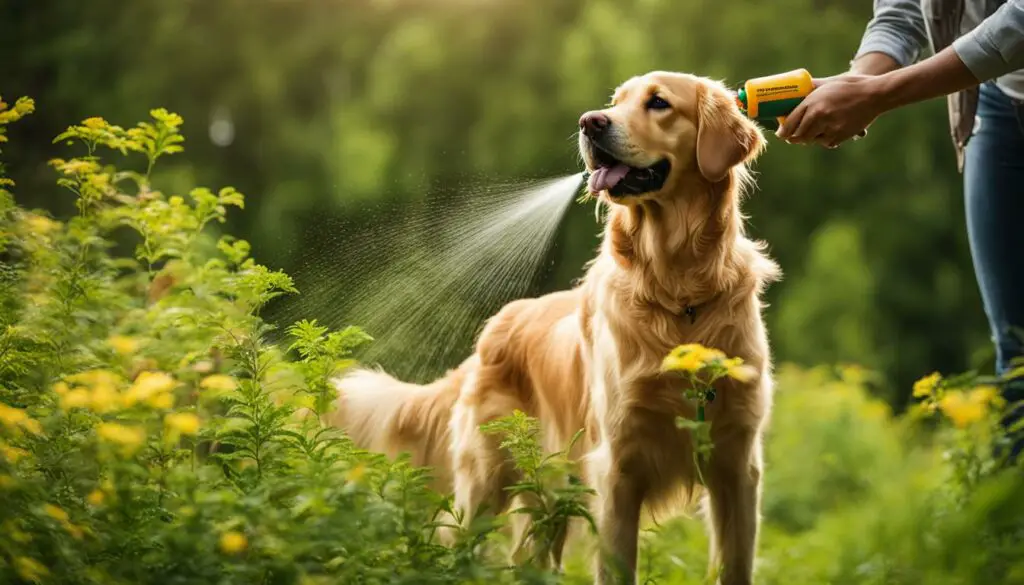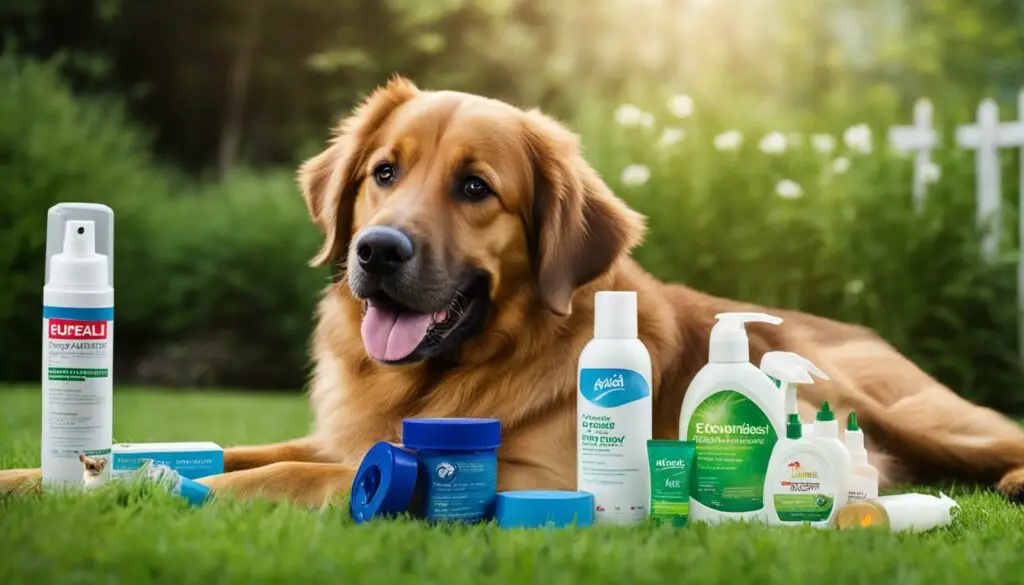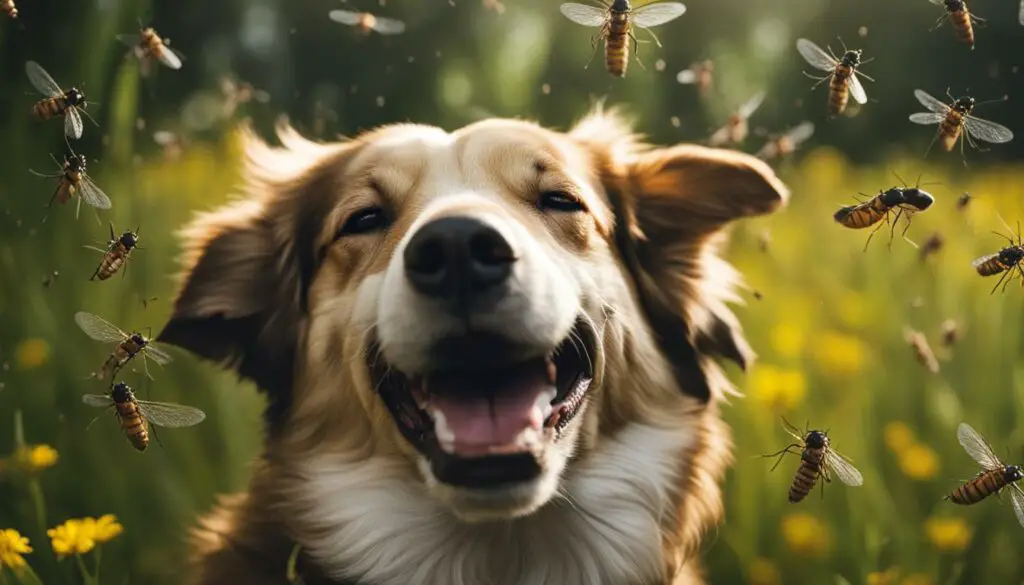As a dog owner, I always want to keep my furry friend safe from pesky bugs. Recently, I made a mistake and sprayed my dog with Off, a bug spray meant for humans. Little did I know, this could have been a dangerous decision.
Using bug spray meant for humans on dogs can be risky due to the presence of DEET, which is toxic to our canine companions. It can cause skin irritation, neurological symptoms, and even seizures. That’s why it’s crucial to exercise caution and find alternative methods to protect our beloved dogs from bugs.
During my journey to find a safer bug protection method for my dog, I learned a lot about why human bug sprays are a no-go for our furry friends and discovered effective alternatives. In this guide, I’ll share my findings and provide valuable information on how to keep your dog protected without putting their health at risk.
Key Takeaways:
- Using bug spray meant for humans, like Off, on dogs can be dangerous due to the presence of DEET, which is toxic to canines.
- DEET can cause skin irritation, neurological symptoms, and even seizures in dogs, making pet-safe alternatives essential.
- Reduce standing water, use citronella candles, avoid outdoor activities at dawn and dusk, and explore vet-approved insect repellents as alternative bug protection methods.
- Consult with a veterinarian before using any pet-safe mosquito repellents or prescription bug protection options for dogs.
- In case of accidental exposure to bug spray or preventatives, seek veterinary attention immediately and follow the recommended decontamination procedures.
Can You Put Bug Spray on Dogs?
As a responsible pet owner, you may be wondering if it’s safe to use bug spray on your furry companion. The short answer is no, you should not use human bug sprays containing DEET on dogs. DEET, also known as N,N-Diethyl-meta-toluamide, is a common ingredient in many bug repellents designed for humans, but it can be toxic to dogs.
Exposure to DEET can cause serious skin irritation and neurological symptoms in dogs. These symptoms may include tremors, disorientation, and even seizures. It’s important to prioritize the safety and well-being of your four-legged friend by seeking pet-safe alternatives for bug protection.
To protect your dog from bugs without using bug spray, you can try a few alternatives. First, eliminate any standing water in your yard, as mosquitoes tend to breed in stagnant water. You can also use citronella candles or avoid outdoor activities during peak mosquito hours, such as dawn and dusk. Additionally, there are vet-approved insect repellents specifically formulated for dogs that you can consider.

Why Is Bug Spray with DEET Dangerous for Dogs?
Bug sprays containing DEET can be extremely dangerous for dogs. DEET, also known as N,N-Diethyl-meta-toluamide, is a common active ingredient found in many insect repellents. While DEET is effective at repelling bugs, it can have severe consequences when used on dogs.
When dogs come into contact with DEET, either by direct application or by licking it off surfaces, it can lead to various health issues. One of the primary concerns is skin irritation, which can cause redness, itching, and discomfort for the dog. Additionally, DEET can be absorbed through a dog’s skin and into their bloodstream, potentially leading to neurological symptoms such as tremors, disorientation, and even seizures.
Exposure to bug spray with DEET should be avoided for dogs due to the potential for these harmful effects. Instead, it is important to seek out pet-safe alternatives that can effectively protect dogs from bugs without risking their health. Taking these precautions can ensure the well-being and safety of our furry friends.

What Makes DEET Toxic to Dogs?
| DEET | Dog’s Health |
|---|---|
| Can cause skin irritation | Redness, itching, discomfort |
| Can be absorbed through the skin | Neurological symptoms: tremors, disorientation, seizures |
As the table demonstrates, DEET can have serious consequences for a dog’s health. Skin irritation can be painful and uncomfortable for dogs, while neurological symptoms can be severe and even life-threatening. It is crucial to prioritize the safety of our canine companions and explore alternative insect repellent options that are specifically formulated for dogs.
What Are the Symptoms of DEET Poisoning in Dogs?
Symptoms of DEET poisoning in dogs can vary depending on the concentration of DEET and the amount of exposure. If your dog has been exposed to DEET, it is important to be vigilant for any signs of poisoning. Here are some common symptoms to look out for:
- Excessive drooling: Dogs may drool excessively as a result of DEET poisoning.
- Vomiting and diarrhea: Digestive issues like vomiting and diarrhea can occur after DEET exposure.
- Skin irritation: DEET can cause skin irritation in dogs, leading to redness, itching, and inflammation.
- Disorientation: Dogs exposed to DEET may become disoriented and show signs of confusion or unsteadiness.
- Trembling: Tremors or shaking can be a symptom of DEET poisoning in dogs.
- Seizures: In severe cases, DEET poisoning can cause seizures in dogs.
If you notice any of these symptoms after your dog has been exposed to DEET, it is important to seek immediate veterinary care. Prompt treatment can help minimize the impact of DEET poisoning and ensure the well-being of your dog.
It is worth mentioning that the severity of symptoms can vary depending on the concentration of DEET and the size and overall health of the dog. Some dogs may be more sensitive to DEET and exhibit stronger reactions, while others may show milder symptoms. Regardless, any sign of DEET poisoning should be taken seriously and addressed by a veterinarian.
| Symptoms of DEET Poisoning | Severity |
|---|---|
| Excessive drooling | Mild to moderate |
| Vomiting and diarrhea | Mild to moderate |
| Skin irritation | Mild to moderate |
| Disorientation | Moderate |
| Trembling | Moderate |
| Seizures | Severe |
“If you suspect your dog has been exposed to DEET and is showing symptoms of poisoning, it is crucial to act quickly. Contact your veterinarian for guidance and follow their instructions for decontamination and treatment.”
How to Protect Dogs from Mosquitoes Without Bug Spray
Protecting dogs from mosquitoes is important to prevent them from getting bitten and potentially contracting diseases such as heartworm. While bug spray with DEET should not be used on dogs, there are alternative methods to protect them from mosquitoes.
Reducing standing water: Mosquitoes breed in stagnant water, so it’s important to eliminate any areas of standing water in your yard. Emptying and cleaning water bowls, bird baths, and other containers regularly can help reduce mosquito breeding grounds.
Using citronella candles: Citronella candles can help repel mosquitoes. Place them in outdoor areas where your dog spends time and light them when mosquitoes are most active, such as during dusk and dawn. However, it’s important to keep an eye on your dog to ensure they don’t accidentally knock over the candles.
Avoiding outdoor activities at dawn and dusk: Mosquitoes are most active during these times, so it’s best to limit outdoor activities during dawn and dusk when possible. This can help reduce your dog’s exposure to mosquitoes.
Using vet-approved and pet-safe insect repellents: There are insect repellents specifically formulated for dogs that are safe to use. These products typically contain natural ingredients that are effective in repelling mosquitoes without causing harm to your dog. Consult with your veterinarian to find the best option for your dog.

By taking these precautions and using alternative methods to protect dogs from mosquitoes, you can help ensure their comfort and reduce the risk of them contracting mosquito-borne diseases.
Pet-Safe Mosquito Repellents for Dogs
Mosquitoes can be a nuisance for our furry friends, but it’s important to use pet-safe mosquito repellents to protect them from these pesky insects. Here are some vet-approved options to consider:
1. Combination flea and tick preventatives: Many flea and tick preventive treatments for dogs also repel mosquitoes. These products, such as Advantix and Frontline, are designed to protect dogs from a range of pests, including mosquitoes. They are available in various forms, including spot-on treatments and oral medications.
2. Mosquito-repelling plants: Certain plants naturally repel mosquitoes and can be a safe option for dogs. Basil, catnip, lemon balm, and rosemary are some examples of plants that have mosquito-repelling properties. You can plant these herbs in your garden or use their essential oils diluted in a carrier oil for topical application. However, always consult with a veterinarian before using essential oils on your pets.

3. Lemon eucalyptus oil: Lemon eucalyptus oil is an effective natural mosquito repellent for both humans and dogs. It contains a compound called PMD (p-menthane-3,8-diol) that repels mosquitoes. However, it’s important to note that some dogs may be sensitive to essential oils, so it’s best to test a small amount on a small area of your dog’s skin before using it extensively.
Remember, before using any mosquito repellents on your dog, it is crucial to consult with a veterinarian. They can provide guidance on the best options for your dog’s specific needs and ensure their safety.
What to Do If Your Dog is Exposed to DEET
If your dog is exposed to DEET, it is important to take immediate action to minimize the potential harm caused by this toxic substance. Here are some steps to follow if your dog comes into contact with DEET:
1. Remove Your Dog from the Source of Exposure
If your dog has been sprayed directly with bug spray containing DEET or has come into contact with an area where DEET has been applied, carefully remove your dog from that environment. This will help to prevent further exposure and minimize the risk of ingestion or skin absorption.
2. Contact Your Veterinarian
Reach out to your veterinarian as soon as possible to seek professional guidance. They will be able to provide specific advice based on your dog’s individual circumstances and the severity of the exposure. Keep your veterinarian’s contact information easily accessible for emergencies like this.
3. Follow Decontamination Procedures
Your veterinarian may recommend decontamination procedures to remove the DEET from your dog’s fur and skin. This can involve bathing your dog with a mild dishwashing detergent or a gentle pet shampoo. It is important to carefully follow the instructions provided by your veterinarian to ensure effective decontamination while minimizing any further harm.
4. Monitor for Symptoms
After the exposure, carefully monitor your dog for any symptoms of DEET poisoning. These symptoms can include excessive drooling, vomiting, diarrhea, skin irritation, disorientation, trembling, and seizures. If you notice any of these symptoms or any other concerning signs, contact your veterinarian immediately for further guidance.
Remember, prevention is always better than cure. Avoid using bug sprays containing DEET on your dog and opt for pet-safe alternatives instead. By taking proactive steps to protect your dog from bugs and being prepared in case of exposure, you can help ensure the well-being and safety of your furry friend.
| Signs of DEET Poisoning in Dogs | Dos and Don’ts |
|---|---|
| Excessive drooling | Do: Remove the dog from the source of exposure |
| Vomiting | Do: Contact your veterinarian |
| Diarrhea | Do: Follow decontamination procedures |
| Skin irritation | Do: Monitor for symptoms |
| Disorientation | Don’t: Use bug sprays containing DEET on your dog |
| Trembling | Don’t: Delay in seeking veterinary care |
| Seizures | Don’t: Ignore any concerning signs |
The Dangers of Essential Oils and Citronella Products for Dogs
While essential oils and citronella products may seem like natural alternatives to bug spray for dogs, they can actually pose significant risks to their health. It is important for dog owners to be aware of the potential dangers associated with these products and take necessary precautions to keep their pets safe.
The Toxicity of Essential Oils
Essential oils, although derived from plants, can contain compounds that are toxic to dogs. Different essential oils have varying levels of toxicity, and even small amounts can cause harm. Common symptoms of essential oil poisoning in dogs include upset stomach, drooling, difficulty breathing, liver damage, and neurologic abnormalities. Some essential oils that are particularly dangerous to dogs include tea tree oil, cinnamon, citrus oils, and wintergreen. It is crucial to keep essential oils securely stored and out of reach of pets to prevent accidental ingestion.
The Hazards of Citronella Products
Citronella products, including candles, sprays, and collars, are often used as a natural insect repellent. However, these products can be harmful to dogs if ingested or applied directly to the skin. Citronella can cause skin irritation, vomiting, weakness, depression, and even hypothermia in dogs. It is important to avoid using citronella products on dogs and to choose safer alternatives for bug protection.
| Product | Dangers | Safe Alternatives |
|---|---|---|
| Essential Oils | Potential toxicity, liver damage, neurologic abnormalities | Vet-approved insect repellents, natural bug-repelling plants |
| Citronella Products | Skin irritation, vomiting, weakness, depression, hypothermia | Pet-safe insect repellents, bug-repelling plants |
It is always recommended to consult with a veterinarian before using any products on your dog. They can provide guidance on safe alternatives for bug protection and help you choose the best options for your pet’s specific needs. Remember, the health and well-being of your furry friend should always be a top priority.
Prescription Options for Bug Protection in Dogs
When it comes to protecting our furry friends from bugs, there are a variety of prescription options available that can provide safe and effective bug protection. These prescription options are specifically formulated for dogs and offer a reliable alternative to human bug sprays containing DEET. It is important to note that while these products are safe for dogs, they can be extremely toxic to cats, so dog owners with both cats and dogs should exercise caution and prevent cats from grooming treated dogs.
One popular prescription option for bug protection in dogs is Advantix. Advantix is a combination flea and tick preventative that also offers protection against mosquitoes. It contains the active ingredients Imidacloprid and Permethrin, which are effective at repelling and killing a wide range of insects. Another option is Frontline, which also provides protection against fleas, ticks, and mosquitoes. Frontline contains Fipronil, which kills adult fleas and ticks on contact.
It is important to consult with a veterinarian before using any prescription bug protection products on your dog. The veterinarian can assess your dog’s individual needs and recommend the most suitable option based on factors such as the dog’s size, age, and any existing health conditions. Additionally, the veterinarian can provide guidance on proper application and dosage to ensure optimal effectiveness and safety.
| Prescription Option | Active Ingredients | Bug Protection |
|---|---|---|
| Advantix | Imidacloprid, Permethrin | Fleas, ticks, mosquitoes |
| Frontline | Fipronil | Fleas, ticks, mosquitoes |
It is essential to follow the veterinarian’s instructions and recommendations when using prescription bug protection products. This includes applying the product as directed, monitoring for any adverse reactions or side effects, and adhering to the recommended dosage schedule. If you have any concerns or notice any unusual symptoms in your dog after using a prescription bug protection product, it is important to contact your veterinarian for further guidance and assistance.
Tips for Safe Bug Protection for Dogs and Cats
When it comes to protecting our furry friends from bugs, it’s essential to prioritize their safety and wellbeing. As pet owners, we must be cautious and choose pet-safe alternatives to keep our dogs and cats protected. Here are some tips for ensuring safe bug protection for your beloved pets:
1. Avoid Using Human Bug Sprays
While it may be tempting to use the bug spray you have on hand for your pet’s protection, it’s important to remember that human bug sprays containing DEET can be toxic to dogs and cats. DEET can cause skin irritation and neurological symptoms in pets, leading to discomfort and potential health issues. Instead, opt for pet-safe alternatives that are specifically formulated for dogs and cats.
2. Consult with a Veterinarian
Consulting with a veterinarian is crucial when it comes to bug protection for your pets. They can provide valuable guidance on the most suitable and effective options for your specific pet’s needs. A veterinarian can recommend vet-approved insect repellents, flea and tick preventatives, and other pet-safe products that will help keep your furry friends bug-free without compromising their health.
3. Proper Application and Follow Instructions
When using any bug protection products for your pets, it’s essential to follow the instructions provided by the manufacturer and your veterinarian. Ensure proper application, such as applying the product on the appropriate areas of your pet’s body and avoiding contact with sensitive areas like the eyes and mouth. By adhering to the recommended guidelines, you can maximize the effectiveness of the bug protection while minimizing any potential risks.
| Pet-Safe Bug Protection Tips | |
|---|---|
| Use pet-safe alternatives | √ |
| Consult with a veterinarian | √ |
| Proper application and follow instructions | √ |
| Avoid using human bug sprays | × |
By implementing these tips and being mindful of your pet’s safety, you can ensure that they are protected from bugs while enjoying a happy and healthy life. Remember, prevention is key, and establishing a bug protection routine for your pets will help minimize the risk of infestations and bug-borne diseases.

Importance of Year-Round Bug Protection for Pets
When it comes to protecting our pets from bugs, it is vital to prioritize year-round prevention. Bug-borne diseases, such as heartworm, can pose serious health risks to dogs and cats. By implementing a comprehensive bug protection plan, pet owners can ensure the overall well-being of their furry friends.
One key reason for year-round bug protection is the potential threat of heartworm disease. Heartworm is transmitted through mosquito bites and can lead to severe health problems, including heart failure and organ damage. This is why it is crucial to protect pets from mosquitoes, not only during the warmer months but also throughout the year.
In addition to heartworm, other bugs like fleas and ticks can also cause harm to pets. Fleas can cause discomfort, itching, and allergic reactions, while ticks can transmit diseases such as Lyme disease and Rocky Mountain spotted fever. By implementing year-round bug protection measures, pet owners can significantly reduce the risk of infestation and disease transmission.
Consulting with a veterinarian is essential when developing a bug protection plan for pets. They can recommend appropriate preventatives based on the specific needs of the pet, taking into account factors such as the local bug population, the pet’s lifestyle, and any existing health conditions. Veterinarians can provide expert guidance on the best preventive measures, such as prescription options and pet-safe natural alternatives.
By prioritizing year-round bug protection for pets, pet owners can ensure their furry companions enjoy a healthy and happy life, free from the risks and discomfort associated with bug-borne diseases. With the help of veterinarians and the use of appropriate preventatives, we can keep our pets safe from bugs and provide them with the protection they deserve.
What to Do If Your Pet Is Exposed to Bug Spray or Preventatives
If your pet is accidentally exposed to bug spray or preventatives, it is important to take immediate action to ensure their safety and well-being. Here are some steps you can follow:
1. Remove Your Pet from the Source
If your pet comes into contact with bug spray or gets exposed to preventatives, try to remove them from the area or product immediately. Use gloves or protective clothing to prevent any contact with your own skin.
2. Check for Symptoms
Observe your pet closely for any signs of adverse reactions. Common symptoms of exposure to bug spray or preventatives can include excessive drooling, vomiting, diarrhea, skin irritation, disorientation, trembling, and seizures. If you notice any of these symptoms, it is crucial to seek veterinary attention.
3. Contact Your Veterinarian
Reach out to your veterinarian or an animal emergency hospital as soon as possible. Describe the product your pet was exposed to and provide any relevant information, such as the active ingredients or concentration levels, if known. Your veterinarian will be able to provide specific guidance based on the situation.
4. Follow Veterinary Instructions
Follow the instructions given by your veterinarian for decontamination or further treatment. Depending on the severity of the exposure, your pet may require a thorough bath using mild dishwashing detergent to remove the product. In more serious cases, additional medical intervention or monitoring may be necessary.
Remember, prompt action is vital when it comes to accidental exposure to bug spray or preventatives. By taking the necessary steps and seeking veterinary care, you can help ensure the well-being and safety of your beloved pet.

Conclusion
In conclusion, it is crucial to prioritize the safety and well-being of our canine companions when it comes to bug protection. Using human bug sprays containing DEET on dogs can be extremely dangerous, causing skin irritation and neurological symptoms. It is vital to find pet-safe alternatives and consult with a veterinarian to ensure the proper protection of our furry friends.
Instead of relying on bug sprays with DEET, there are several alternative methods available to protect dogs from bugs. These include reducing standing water, using citronella candles, and avoiding outdoor activities during peak bug activity. Additionally, there are vet-approved and pet-safe insect repellents, as well as combination flea and tick preventatives, that can be used to keep bugs at bay.
When it comes to bug protection, it is essential to be cautious and informed. Avoid using essential oils and citronella products, as they can be harmful to dogs. Additionally, pet owners with both dogs and cats should be mindful of using products containing pyrethrin and permethrin, as they can be toxic to cats. Consulting with a veterinarian and following their recommendations will help ensure the safety and well-being of our beloved pets.
By implementing year-round bug protection measures, we can safeguard our pets from harmful bug-borne diseases, such as heartworm, and reduce the risk of infestations. Remember, if your pet is exposed to bug spray or preventatives, seeking veterinary attention is crucial. Contact your veterinarian or an animal emergency hospital for guidance and follow their recommended decontamination procedures.
FAQ
Can I put bug spray on my dog?
No, it is not safe to use bug spray meant for humans on dogs. Bug sprays with DEET, which are commonly used by humans, can be toxic to dogs and cause skin irritation, neurological symptoms, and seizures.
Why is bug spray with DEET dangerous for dogs?
Bug sprays containing DEET are dangerous for dogs because DEET is toxic to them. Dogs can develop skin irritation, neurological symptoms, and even seizures from exposure to DEET.
What are the symptoms of DEET poisoning in dogs?
Symptoms of DEET poisoning in dogs include excessive drooling, vomiting, diarrhea, skin irritation, disorientation, trembling, and seizures. The severity of symptoms can vary depending on the concentration of DEET and the amount of exposure.
How can I protect my dog from mosquitoes without bug spray?
To protect your dog from mosquitoes without using bug spray, you can reduce standing water around your home, use citronella candles, avoid outdoor activities at dawn and dusk, and use vet-approved and pet-safe insect repellents.
What are some pet-safe mosquito repellents for dogs?
Some pet-safe mosquito repellents for dogs include combination flea and tick preventatives, as well as mosquito-repelling plants like basil, catnip, lemon balm, and rosemary. Lemon eucalyptus oil can also be effective, but it is important to check for any potential sensitivities in pets. It is recommended to consult with a veterinarian before using any products.
What should I do if my dog is exposed to DEET?
If your dog is exposed to DEET, it is recommended to contact a veterinarian for guidance. Decontamination may be necessary, including bathing with a mild dishwashing detergent to remove the product. If your dog ingests a large amount of DEET or shows severe symptoms, immediate veterinary care is advised.
Are essential oils and citronella products safe for dogs?
No, essential oils and citronella products can be harmful to dogs. Different essential oils have varying levels of toxicity, and both dogs and cats can experience symptoms ranging from upset stomach to liver damage and neurologic abnormalities. Citronella is toxic to pets and can cause skin irritation, vomiting, weakness, depression, and hypothermia.
Are there prescription options for bug protection in dogs?
Yes, there are prescription options available for bug protection in dogs, such as combination flea and tick preventatives like Advantix and Frontline. However, it is important to note that products containing pyrethrin and permethrin, which are safe for dogs, can be extremely toxic to cats. Dog owners with both dogs and cats should be cautious and prevent cats from grooming dogs treated with these products.
What are some tips for safe bug protection for dogs and cats?
When protecting dogs and cats from bugs, it is important to consult with a veterinarian and use caution. Avoid using human bug sprays containing DEET on pets, be mindful of the potential dangers of essential oils and citronella products, use vet-approved and pet-safe options, ensure proper application, and follow any specific instructions or recommendations from the veterinarian.
Why is year-round bug protection important for pets?
Year-round bug protection is important for pets to ensure their overall health and well-being. Bug-borne diseases, such as heartworm, can be a serious threat to dogs and cats. Consulting with a veterinarian and using appropriate preventatives can help protect pets from these diseases and reduce the risk of infestations.
What should I do if my pet is exposed to bug spray or preventatives?
If your pet is accidentally exposed to bug spray or preventatives, it is important to seek veterinary attention. Contact your veterinarian or an animal emergency hospital for guidance and follow any recommended decontamination procedures. Providing details about the product and ingredients can help the veterinarian determine the appropriate course of action.





